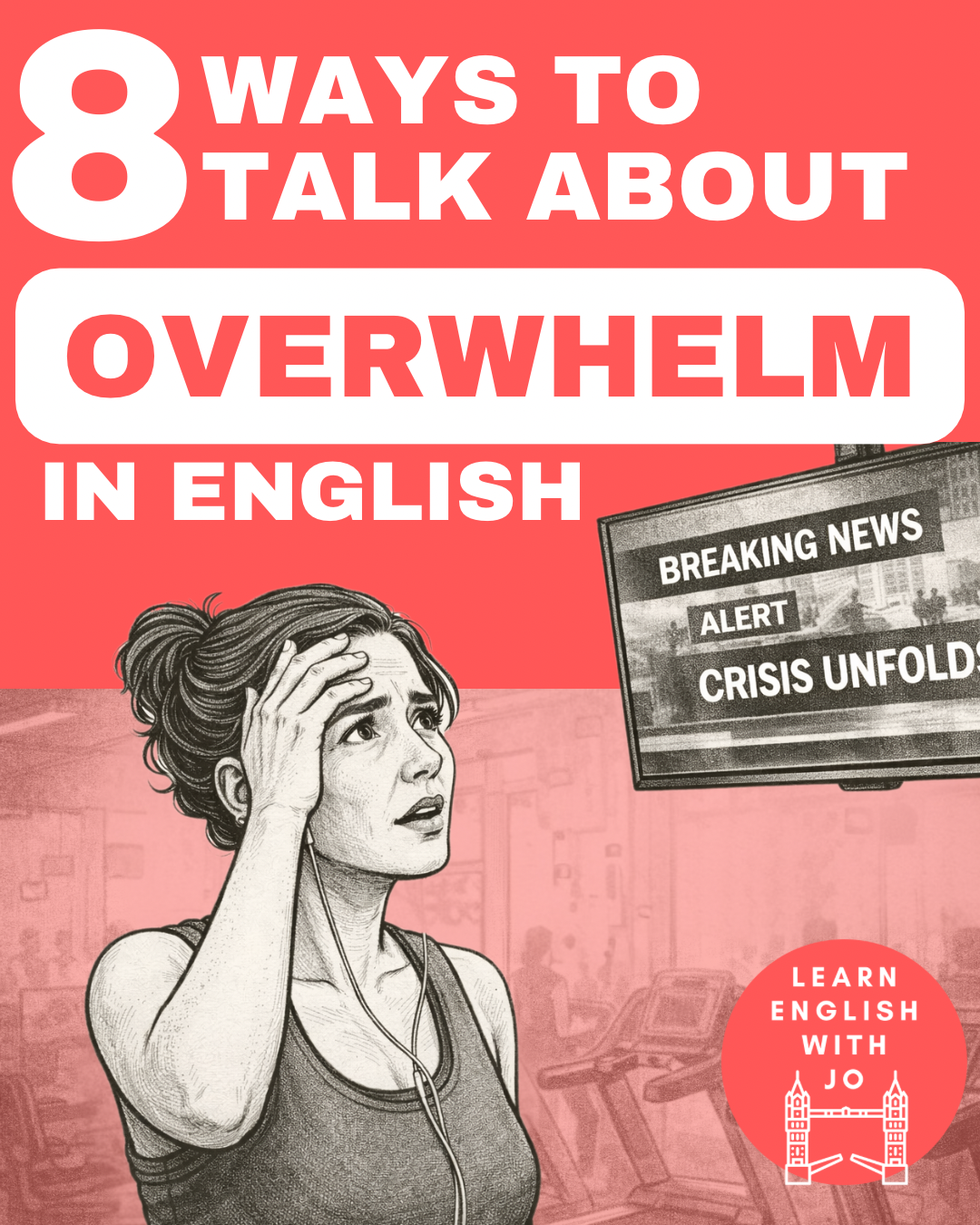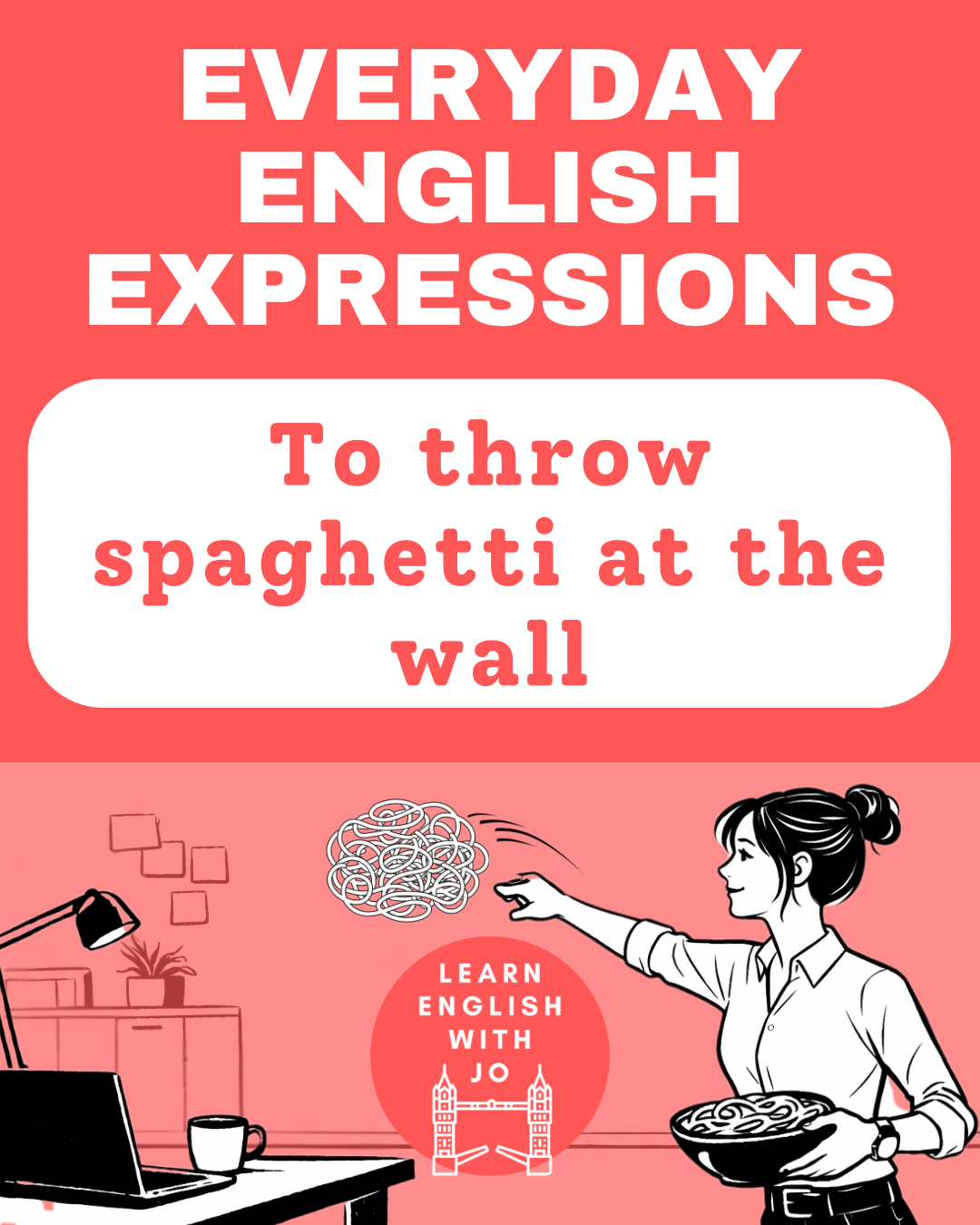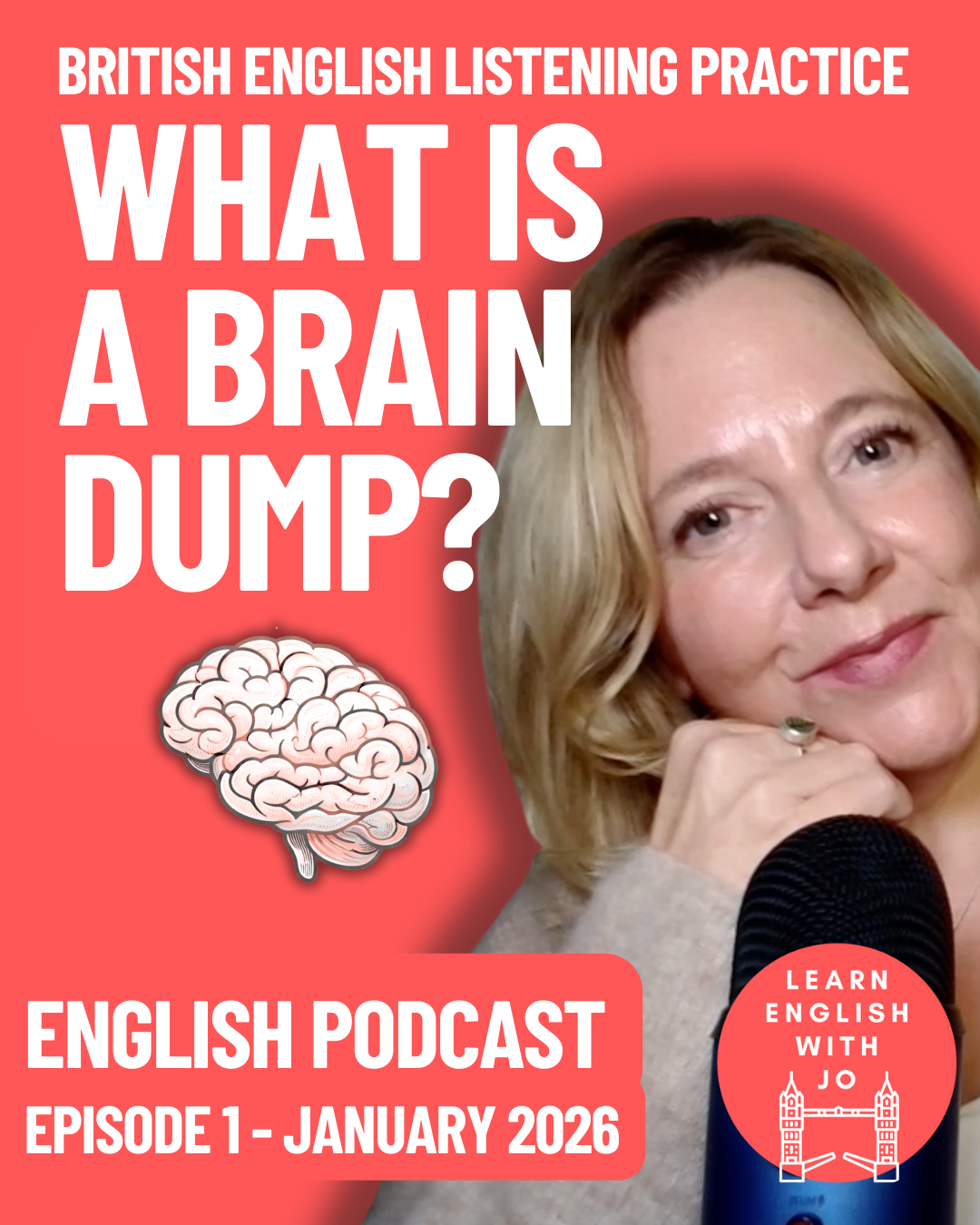Recent Posts

8 Ways To Talk About Overwhelm in English
In today’s post, I want to share a few gentle, everyday phrases you can use when the news feels overwhelming. Not dramatic. Not overly formal. Just the kind of language people really use when they’re trying to make sense of a heavy moment.

What Does It Mean To Throw Spaghetti At The Wall?
You’ll often hear people say they’re ‘throwing spaghetti at the wall’ when they talk about work, creativity, or trying something new.
It sounds chaotic, slightly ridiculous, and not especially professional. Today’s blog explores what this English expression really means, why people use it and how to use it yourself.

My English Brain Dump Podcast - Episode One
In this post, I introduce Jo’s English Brain Dump, my new podcast for natural British English listening practice. This first episode is completely unscripted and designed to help you get used to real spoken English, just as it sounds in everyday life. You’ll find the full episode here, along with a word-for-word transcript you can read or download as a PDF.
![15 English Phrasal Verbs for Talking About the New Year [2026 Edition]](https://images.squarespace-cdn.com/content/v1/62cab5235faf47112727daa7/1df4ccd0-2da6-41c9-bfe0-358a2aec3361/newyearphrasal2026+-+1.png)
15 English Phrasal Verbs for Talking About the New Year [2026 Edition]
If you want to talk about the new year naturally in English, in a way that sounds calm, realistic, and human, then phrasal verbs are exactly what you need. These are the ones native speakers actually use when talking about habits, reflection, and change.

How To Swear In British English
British English has a reputation for politeness, understatement, and apologising far too much. And yet, quietly tucked into everyday conversation, there’s another layer of language that learners are often curious about but rarely taught properly: swearing.
Today’s blog explains the tone, context, humour, and cultural nuance of swearing in British English.

8 Things to Stop Doing If You Want to Improve Your English in 2026
Improving your English in 2026 does not have to mean longer study sessions or complex routines. Sometimes the most powerful changes come from removing the habits that slow you down. This post takes an honest look at eight things that many learners do out of habit or guilt, and explains why letting go of them can make your English feel lighter, more fluent, and much more you.

12 English Phrasal Verbs For Winter
Winter in Britain has a way of slowing us down and pulling us indoors. It is the perfect time to learn some cosy, practical phrasal verbs that English speakers genuinely use when the temperature drops. From wrapping up to snuggling up, here are the expressions you will hear all season long.

How to Say No Politely in English
In British English, we are masters at avoiding the word no. We soften it. We delay it. We apologise for it. And sometimes we are so indirect that people do not even realise we have said no.
But here is the thing. You can learn to say no politely, confidently, and without that familiar wave of guilt. And that is what I want to show you today.

15 Everyday British English Expressions You’ll Hear All the Time
Today I’m sharing 15 British English expressions that I personally use every single day. They’re simple, incredibly common, and perfect for intermediate and advanced learners who want to sound more fluent and confident.

English Idiom: To Nail It
Have you ever heard someone say ‘You nailed it’ and wondered what it actually means?
It’s one of those common English idioms that native speakers use all the time at work and in everyday conversations. You may have noticed it being used in reality TV shows like The Great British Bake Off. It’s short, snappy and positive and it’s a great one to start using if you want to sound more natural in English.

English Idioms for Effort and Achievement
We all know that feeling when something finally pays off. When you’ve worked hard, stayed focused, and achieved what you set out to do. English has some great idioms to express those moments of effort, achievement, and well-deserved success.
Here are five common idioms you can use to talk about success in everyday English.

English Phrasal Verbs With Call
We all know the verb call: to phone someone, to shout their name across the street, to name something. But like many small English words, it takes on a completely new life when we start combining it with little prepositions such as on, off, out, and back.
Let’s look at some of the most common English phrasal verbs with ‘call’ that you’ll actually hear and say in real life.

How to Make a Good First Impression in English
Meeting someone for the first time can feel awkward, especially in another language. In this post, I’ll show you how to make a warm, confident first impression in English, not by being perfect, but by being yourself. You’ll learn practical British English phrases, cultural insights, and confidence tips to help you connect naturally in real-life conversations.

15 Common English Collocations with ‘Mind’
The word ‘mind’ appears in so many English expressions. We use it to talk about remembering things, making decisions, describing how we feel, and even connecting with others.
Here are 15 useful collocations with ‘mind’ that will help you sound more natural and fluent in everyday English.

8 Natural English Expressions for Talking About Disappointment
We’ve all been there; the film that didn’t live up to the hype, the event that sounded amazing but turned out to be a bit of a let-down.
Disappointment is one of those universal feelings we all experience, and English has so many natural expressions to describe it. So today I’ve got 8 useful ways to talk about disappointment in English, with examples to help you use them naturally in real life.

How To Sound More British When You Speak English
If you’ve ever wondered how to sound more natural in a British English conversation, you might have noticed that it’s not just about vocabulary and grammar. The way British people speak is full of little quirks, habits and cultural expressions that make our conversations instantly recognisable.
This article (and my YouTube video) is a tongue-in-cheek guide to some of those habits.

10 English Phrasal Verbs with Drop
Phrasal verbs can feel a bit tricky sometimes. One little word like drop can suddenly have all these extra meanings when you add a small preposition. But the good news is that these verbs are super common in everyday English and once you know them, you’ll hear them everywhere.
Today, let’s look at 10 phrasal verbs with drop that you can start using straight away.

28 Everyday British English Slang Expressions
British people love slang. We use it constantly; in conversations with friends, at work, online, and even with complete strangers. The tricky thing is, a lot of it isn’t taught in English classes or textbooks. That’s why many learners feel confused when they hear phrases like “I had a wobble” or “That meeting did my head in.”
In this post, I’ve collected 28 slang expressions you’ll hear all the time in 2025.

Phrasal Verbs with 'Cut' You Need to Know
When you think of the verb 'cut', you might picture scissors, knives or haircuts. But in English, 'cut' takes on a whole new life when combined with little words like 'off', 'out' or 'back'. These combinations are called phrasal verbs, and they are some of the trickiest parts of English to master.
In this post we will look at some of the most common phrasal verbs with 'cut' and see how they are used in everyday situations.

Top 10 British English Passive Aggressive Phrases
Polite British English isn’t always as polite as it sounds. Sometimes our pleasant words are doing a very different job – softening a refusal, hiding disagreement, or gently shutting down a conversation without actually saying so.
Today, I’m going to share my top 10 passive aggressive British English phrases – the ones you’ll hear in everyday life that might not mean what you think. We’ll look at what they sound like, what they actually mean, and how to spot the warning signs.
